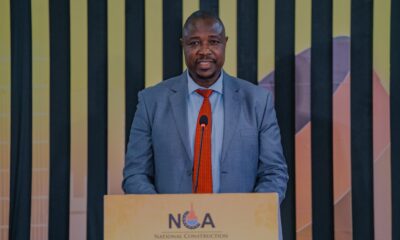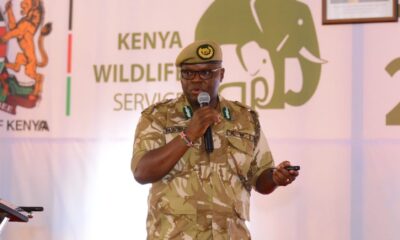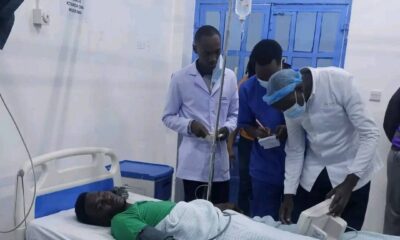Africa
ECOWAS at 50: Reparations and Historical Justice Take Center Stage as Africa Looks to Reclaim Its Past and Future

By Celestine Achi | April 22, 2025 | Accra, Ghana
As the Economic Community of West African States (ECOWAS) marks its golden jubilee with grand celebrations in Accra, Ghana, a pivotal and emotionally charged conversation has taken center stage: the push for reparations for colonial-era injustices and the return of looted African artifacts. Amidst the fanfare, African leaders are signaling a shift towards addressing historical wrongs as a foundation for future development.
During an interview at the ECOWAS 50th Anniversary launch, Nigeria’s Permanent Representative to ECOWAS, Ambassador Musa Sani Nuhu, reaffirmed the regional bloc’s alignment with the African Union’s 2025 theme—heritage restoration and reparative justice.
“I think you’ll recall that the African Union’s theme for the year is in line with these issues, and ECOWAS is part of the African Union,” said Ambassador Nuhu. “ECOWAS supported that theme to be the central focus for 2025.”
He highlighted that ECOWAS has already begun operationalizing this agenda, most notably through the appointment of President Patrice Talon of Benin as the regional champion for the recovery of cultural artifacts looted during the colonial period.
“These items were taken from the region during colonialism. So, of course, ECOWAS is very much on course on this issue,” he added.
When asked whether reparations for colonial injustices should be a central issue for Africa, Ambassador Nuhu was unequivocal:
“Yes, of course. It’s something that is on the table and is being discussed. Such discussions usually begin at the technical level before moving to ministerial discussions and finally to the heads of state. Right now, it is being examined at the technical level.”
His remarks were echoed by Ambassador Josephine Nkrumah, ECOWAS Ambassador to Liberia, who confirmed that the conversation is advancing steadily through the proper institutional frameworks.
“Should reparations for those injustices be a central agenda for Africa? Yes, of course,” Nkrumah said. “It’s something which is on the table, which is being digested at the technical level… I’m sure by the time it reaches the highest level, it will be endorsed.”
A Continental Movement Gathers Momentum
The dialogue on reparations and restitution comes at a time when civil society movements across Africa—and in the diaspora—are ramping up pressure on governments to secure reparative justice for the scars of colonialism, slavery, and cultural erasure. The restitution of artifacts is not only seen as symbolic but also as a vital step in healing the historical wounds inflicted on African societies.
Countries such as Germany, France, and the United Kingdom have begun returning cultural treasures to nations including Nigeria and Benin. These acts, though incremental, have reignited debate on broader reparations—including financial compensation, systemic redress, and education reform.
The Rising Call for Repatriation: A Growing Concern Across Africa
The issue of reparations has become an increasingly pressing concern within African society. Reports from various media outlets suggest that the total value of reparations being discussed could amount to as much as $50 trillion.
Amplifying this message through art and activism, Guinean artist Elie Kamano has released a powerful new anthem titled “Africa Without Africans.” The single resonates deeply with the African Union’s 2025 theme, “Justice for Africans and People of African Descent through Reparations.”
Through evocative lyrics, the song recounts the immense suffering endured during the colonial era and calls on African leaders to take bold action in restoring historical justice. Kamano urges authorities to demand the return of what was unjustly taken from the continent, framing music as a rallying cry for a continent still healing from centuries of exploitation.
ECOWAS at 50: A Symbol of Unity and Future Ambitions
The reparations agenda found a powerful stage at the ECOWAS 50th Anniversary celebration, themed “Stronger Together for a Brighter Future”. Held at the Accra International Conference Center, the event drew leaders and dignitaries from across West Africa, including Ghanaian President John Dramani Mahama, Liberian President Joseph Boakai, and ECOWAS Commission President Dr. Omar Alieu Touray.
President Mahama acknowledged Africa’s shared challenges—political instability, economic inequality, and climate threats—and called for collective solutions rooted in justice and inclusion.
“We must respond not with isolation but with understanding and a willingness to engage,” he said, announcing 1,000 scholarships for students across the subregion as a symbol of pan-African unity and youth empowerment.
Dr. Touray reinforced ECOWAS’ role as a unifying force:
“ECOWAS is not just a regional bloc—it is a symbol of hope, unity, and resilience for West Africa.”
Cultural Renaissance and Restorative Justice
One of the most striking moments of the ceremony came with a theatrical performance titled “Reclaiming Our Destiny”, a dramatic retelling of the glory and wisdom of the ancient empires of Mali, Songhai, and Ghana. The play urged contemporary African leaders to honor their legacy by standing up for justice, culture, and the aspirations of their people.
The unveiling of the ECOWAS at 50 logo, depicting golden rays symbolizing unity and growth, rounded off the day’s events with a hopeful message of regional renewal.
Analysis: A Turning Point for African Leadership?
The renewed emphasis on reparations by ECOWAS represents a notable evolution in the regional bloc’s policy discourse—from economic cooperation to cultural and historical redress. While progress may still be at the technical discussion phase, the political will being demonstrated at the highest levels signals a growing readiness to confront uncomfortable truths.
By prioritizing reparations and heritage recovery, ECOWAS is not merely addressing the past—it is anchoring Africa’s future development on a foundation of justice, dignity, and cultural sovereignty.
As Ambassador Nuhu stated, “By the time it reaches the highest level, it will be endorsed along that line.”
The next 50 years of ECOWAS may well be defined not just by economic integration—but by moral leadership and historical accountability. And that could prove to be the true golden legacy of West Africa’s most enduring regional institution.
Kenya Insights allows guest blogging, if you want to be published on Kenya’s most authoritative and accurate blog, have an expose, news TIPS, story angles, human interest stories, drop us an email on [email protected] or via Telegram
-

 Business1 week ago
Business1 week agoEastleigh Businessman Accused of Sh296 Million Theft, Money Laundering Scandal
-

 Investigations6 days ago
Investigations6 days agoInside Nairobi Firm Used To Launder Millions From Minnesota Sh39 Billion Fraud
-

 Business7 days ago
Business7 days agoMost Safaricom Customers Feel They’re Being Conned By Their Billing System
-

 Business1 week ago
Business1 week agoEXPLOSIVE: BBS Mall Owner Wants Gachagua Reprimanded After Linking Him To Money Laundering, Minnesota Fraud
-

 News6 days ago
News6 days agoUnfit for Office: The Damning Case Against NCA Boss Maurice Akech as Bodies Pile Up
-

 News7 days ago
News7 days agoTax Payers Could Lose Millions in KWS Sh710 Insurance Tender Scam As Rot in The Agency Gets Exposed Further
-

 News7 days ago
News7 days agoPastor James Irungu Collapses After 79 Hours Into 80-Hour Tree-Hugging Challenge, Rushed to Hospital
-

 Sports1 week ago
Sports1 week agoFury as Bettors Demand Probe Into Betika Over Alleged Unpaid Winnings















